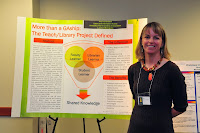- I wanted to work with someone who was doing the role I hope to do some day
- I wanted to collaborate with faculty and practioner to (hopefully) make changes or enhance both the practice and the curriculum
- I wanted to have a unique experience that might elevate me from the title of "student" to be included in big picture thinking about my profession as an information professional
11.29.2010
R-E-S-P-E-C-T
11.16.2010
More than a GAship: The Teach/Library Project Defined
 Here I am w/ my poster....
Here I am w/ my poster....The Teach/Library project is a joint venture between UNCG’s Library and Information Studies department and Jackson Library to foster an innovative exchange of ideas, knowledge sharing and goals among a faculty member, librarian and student. During the course of one academic year, the student works with a librarian in a chosen specialty area. They collaborate to create projects that align with student’s interests and career objectives and practitioner’s needs. The faculty member contributes fundamental understanding, theory and/or learning objectives through either a course or regular meetings. All contribute to the shared knowledge by electronic journal, in this case, a wiki. The DEAL method is used to focus the weekly reflections by asking individuals to describe and examine their own “personal growth” and “academic enhancement”. The final step, “articulate the learning”, is a synthesis of the entire week’s experience; to understand why an experience matters and what changes can be made to improve an experience. (Ash, 2009)
The overall objective is that all three parties are sharing, learning and meeting individual goals. Each is an equal stakeholder in the learning process. Upon project completion, it is desired that a body of work (article, presentation, etc.) will be produced and shared with others outside the institution.
The Difference
The DEAL Method: (Ash, 2009)
- Describe
- Examine
- Articulate Learning
Each member reflects on this process each week and places it in context with experiences learned or observed. The wiki provides a collaborative and engaging space in which to share meaningful dialogue with each other.
The Benefits
- Practical experience while learning “the basics” of library studies
- Networking alliances
- Academic financial support (Student)
- Communicate academic initiatives and needs
- Practitioner viewpoint encouraged
- Collaborative and open – no hierarchy
Ash, Clayton & Moses. (2009). Learning Through Critical Reflection. A Tutorial for Service-Learning Students. Raleigh, NC.
11.15.2010
Posters, posters, everywhere posters

I did my first ever poster presentation. I'm sure some of you may think, 'ho-hum', but it was a great first time experience. This is the second year that my LIS department has done a conference. It's a great way to meet people, network and see what other students are working on with faculty. The conference is called iDEALS...please take a look! I think it's a pretty good conference and if you are local, think about attending next year. (or presenting!)
- It is more informal and not as intimidating as doing a presentation before a large group of people.
- There was no technology setup or snafu's to deal with
- If you are a social butterfly who likes talking to people, it's very fun!
- It's great to find out what others are doing and SHARE, SHARE, SHARE...